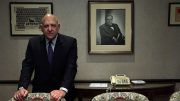Frank Kelly delievrs closing arguments on behalf of Philip Morris, at trial over Robiel Chacon’s lung cancer death.
Miami—Jurors Thursday found a smoker failed state citizenship requirements for purposes of class action membership against the nation’s tobacco companies, clearing Philip Morris of liability for his lung cancer death. Chacon v. Philip Morris, 08-102-CA-09.
Jurors needed only an hour to conclude Robiel Chacon was not a Florida citizen and resident either when his lung cancer was diagnosed on June 3, 1994 or when it manifested, excluding him from the so-called Engle class action against the country’s tobacco companies.
Chacon, who smoked as many as 4 packs of cigarettes a day for 45 years, died in 1996, two years after being diagnosed with lung cancer. His widow, Elsa Chacon, claims Philip Morris, makers of cigarettes her husband smoked, hid the dangers of smoking for decades, leading to her husband’s nicotine addiction and death.
During Thursday’s closing arguments, Elsa Chacon’s legal team requested up to $19 million in compensatory damages, plus a finding of punitive liability.
The case is one of thousands of similar lawsuits stemming from the 2006 Florida Supreme Court decision decertifying Engle v. Liggett Group Inc., a Florida state court class-action lawsuit originally filed in 1994. Although the state’s high court ruled Engle cases must be tried individually, it found plaintiffs could rely on certain jury findings in the original verdict, including the determination that tobacco companies had placed a dangerous, addictive product on the market and had hidden the dangers of smoking. To rely on those findings, individual Engle progeny plaintiffs must establish Florida citizenship, as well as a causal link between nicotine addiction and smoking-related disease.
The nine-day trial ultimately turned on whether Chacon, who had immigrated to New York in the 1950s from Cuba, was a Florida citizen and resident when he developed lung cancer. For purposes of the case, “citizenship” is considered a person’s domicile, or single, fixed permanent home, while residency was considered a person’s established living location for a period of time.
During Thursday’s closing arguments The Alvarez Law Firm’s Alex Alvarez pointed to what he considered “overwhelming” evidence Chacon was a Florida citizen and resident when his cancer developed, including his purchase of a Miami home in 1986, his family’s move to Miami with all of their personal property in 1988, and the filing of a Florida homestead exemption a year later.
“They had no personal property, no furniture, no nothing in New York,” Alvarez said. “He would take a duffle bag when he had to go up to stay at his mother-in-law’s house for some business for a few days.”
However, the defense contended Chacon did not do enough to abandon his New York domicile and establish a Florida domicile that would render him a citizen of that state before doctors diagnosed him with cancer. Shook Hardy Bacon’s Frank Kelly noted Chacon had registered to vote in New York as recently as 1992, despite his family’s move to Florida four years earlier, and he retained a New York driver’s license until a month after his 1994 cancer diagnosis.
Kelly also reminded jurors Elsa Chacon testified her husband, who maintained a business in New York, would come to Florida to see his family for a few days every two or three months. “He had not abandoned New York. His present intention was to be in New York. His future intention, undoubtedly, was to get to Florida,” Kelly said. But, “the evidence is that had not happened” at the time of the cancer diagnosis.
Neither the parties’ attorneys nor Philip Morris representatives could immediately be reached for comment.
Please visit the source link below to read the entire article.
Source: blog.cvn.com




